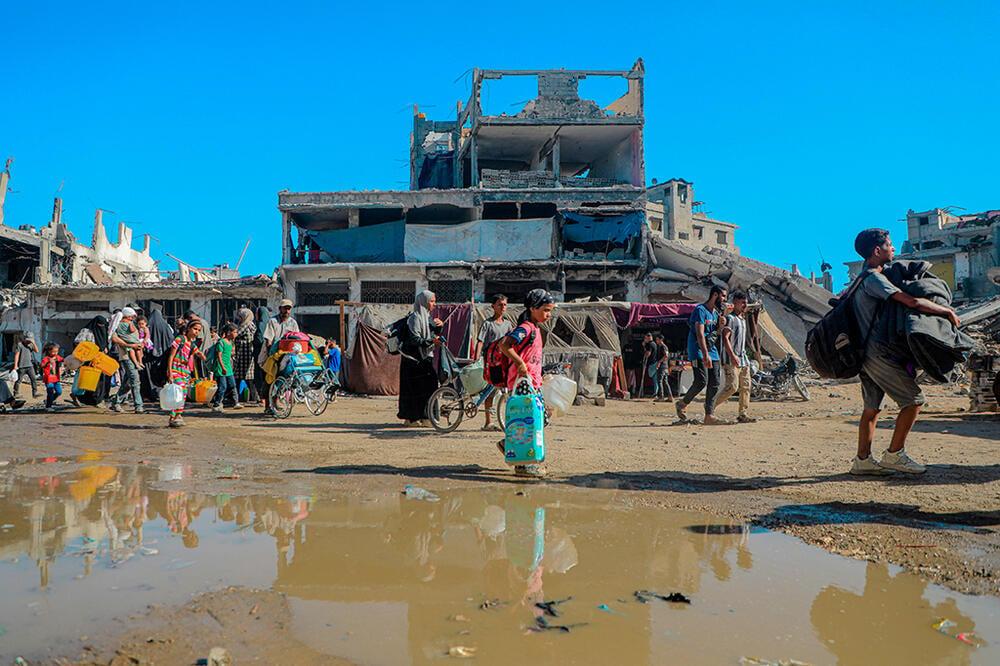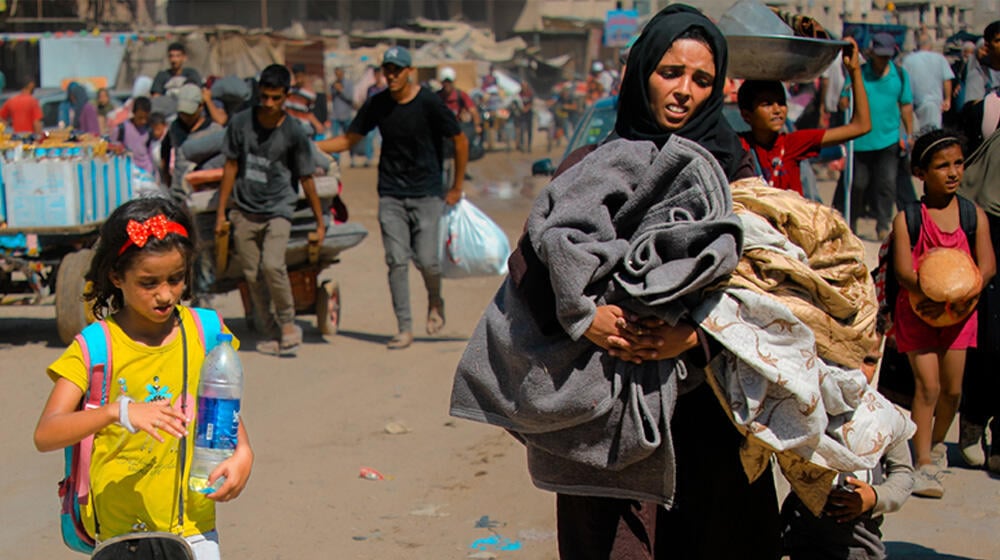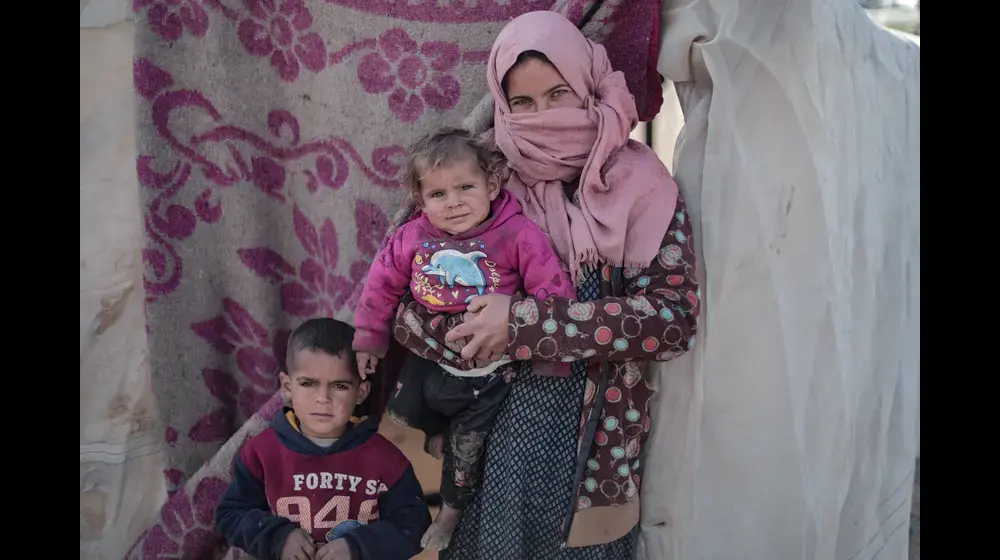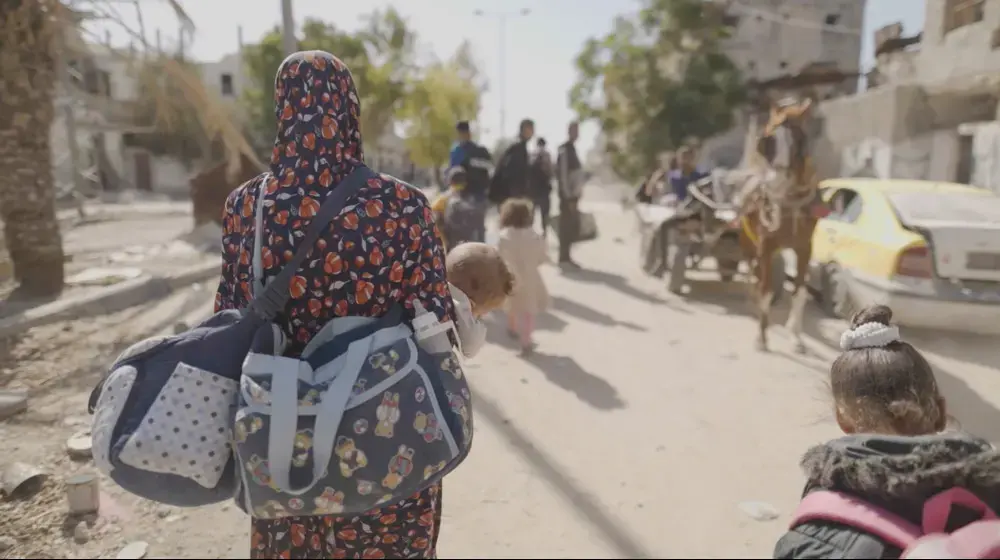As the war on Gaza continues, mass evacuation orders issued by the Israeli military have become an ongoing daily routine, uprooting nearly 90 percent of Gaza’s residents since October 2023. This relentless displacement, often multiple times, has left Palestinians with nowhere safe to turn, stripping them of the basic necessities required to survive. Women and girls, including pregnant and lactating women and adolescent girls, are among the most vulnerable, facing unprecedented challenges to their health and safety.
An escalating humanitarian catastrophe in Gaza
The scale of displacement is staggering. Nearly two million people have been forced from their homes since October 2023. This mass displacement has not only devastated families but also severely disrupted humanitarian operations, with at least 24 humanitarian organizations reporting forced displacement of staff and interrupted support services.
In August alone, Israeli forces issued an average of 12 evacuation orders, about once every two days, displacing up to 250,000 people. Deir Al Balah, one of the few areas with essential infrastructure and warehouses storing aid supplies, has seen its population forced to flee. Families and humanitarian workers are trapped in an endless cycle of displacement, often fleeing under fire with only the belongings they can carry.
“My family and I are taking down our tent and packing our belongings for the second time this August, after being forced to move seven times since October. We have no idea where to go or what to bring with us. When will this ever end?” - Ieman, 42 a displaced mother captures the profound sense of hopelessness shared by many.

The strain of evacuation orders on maternal health and gender-based violence services
The continuous displacement has had a devastating impact on maternal health services in Gaza. At least 17 health facilities, including five primary healthcare centers and nine medical points, have been disrupted by recent evacuation orders. This is particularly alarming given that more than half a million are women of reproductive age, of whom an estimated 50,000 are pregnant.
“Right now, I see thousands of people in the streets, carrying their belongings and fleeing. No one knows what to do or where to go. The danger is imminent, and we have to leave immediately to find a safer place for our children, disconnected from beloved family members and separated from our social networks.” - A displaced mother from Deir Al Balah
The overcrowding in displacement sites, combined with severe shortages of water and sanitation services, has created a breeding ground for disease. Women and girls are at heightened risk of reproductive and urinary tract infections due to the lack of menstrual hygiene products and proper sanitation. Additionally, the threat of gender-based violence looms large.
“The heart is fatigued, the will is broken, and the soul no longer desires anything,” - a GBV Sub-Cluster member, who has been displaced with her children and sick husband for the seventh time.
Challenges to UNFPA’s humanitarian response amid evacuation orders
UNFPA’s humanitarian response has been severely hindered by the ongoing mass evacuation orders and intensified fighting. Multiple evacuation orders have led to the closure of one safe space for women and girls that provided critical protection and support to those at risk of gender-based violence. UNFPA supports hospitals providing emergency obstetric and neonatal care by delivering regular supplies and technical assistance. However, security issues have disrupted these deliveries and fuel supplies, which are essential for maintaining these services. As a result, functioning hospitals are overwhelmed with more patients and have to manage with limited resources. Four UNFPA-supported maternal health service delivery points in the middle area and Khan Younis governorates, which served thousands of women, have also been forced to shut down as a result of the evacuation orders.
“From day one of the war in Gaza, UNFPA has been fully committed to serving women and girls, under very difficult circumstances, to ensure that every childbirth in Gaza is safe and that women are protected from any form of gender-based violence. However, the situation continues to deteriorate as a result of the continuous evacuation orders which have rendered many health facilities inaccessible. This catastrophic situation must end. The war must end now and not tomorrow” - Peninnah T. Kyoyagala, Head of UNFPA Office in Gaza
The logistical challenges are immense. Since early July, UNFPA has managed to bring in only one truckload of desperately needed reproductive health supplies into Gaza due to delays at crossings and man-made logistical hurdles. This shipment, which arrived two days ago, is currently stored in a warehouse that was designated a red zone following an evacuation order and is now inaccessible for distribution to health facilities. Consequently, delays in providing quality healthcare have further endangered the lives of women and girls.
In the north, transporting fuel to key hospitals supported by UNFPA has been impossible for two weeks, critically hindering maternity health services. The fuel, which is distributed by WHO, remains undelivered as requests to travel to the North have been denied by Israeli Authorities.
UNFPA-supported youth volunteers have been crucial in supporting humanitarian efforts, taking on key roles in needs assessments, aid distribution, and implementing youth-led initiatives that have helped thousands of displaced people. Despite their vital contributions, their work has been disrupted by repeated evacuations, forcing them to disperse across various locations and endure increasingly dire conditions.
Evacuation orders have also severely impacted aid workers, including UNFPA staff, who are serving thousands of displaced people. They continue to work under immense challenges, with many living in the streets in makeshift tents and having limited access to water and other essential services.
A call for urgent action
The humanitarian crisis in Gaza is dire. Nearly two million people are internally displaced, with almost the entire population suffering a mental health crisis due to ongoing trauma and pervasive insecurity. Among the displaced are 500,000 women of reproductive age, including 155,000 pregnant and breastfeeding women who lack access to essential maternal health services.
If these conditions persist, the humanitarian response will continue to fall short, leaving the most vulnerable - women, girls, elderly people, and people with disabilities - at even greater risk.
A ceasefire is urgently needed in Gaza to alleviate the suffering of its people. The international community must act swiftly to ensure that the people of Gaza receive the protection and assistance they desperately require.




